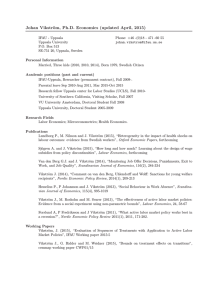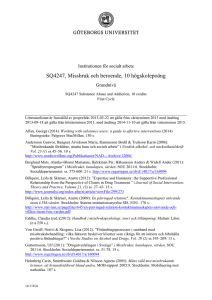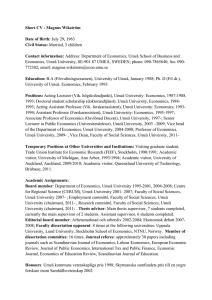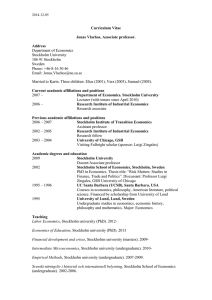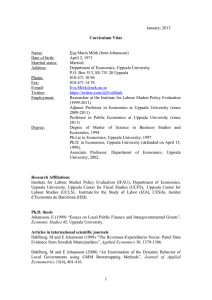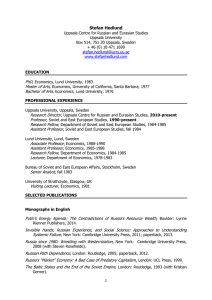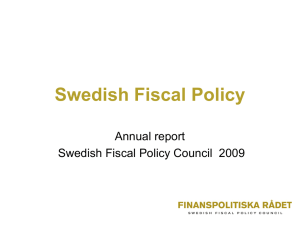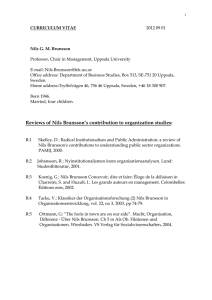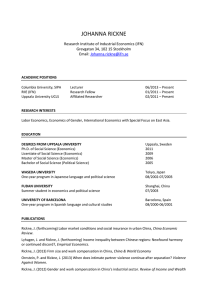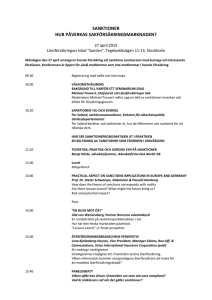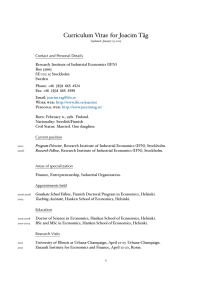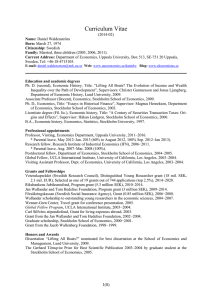Curriculum vitae
advertisement
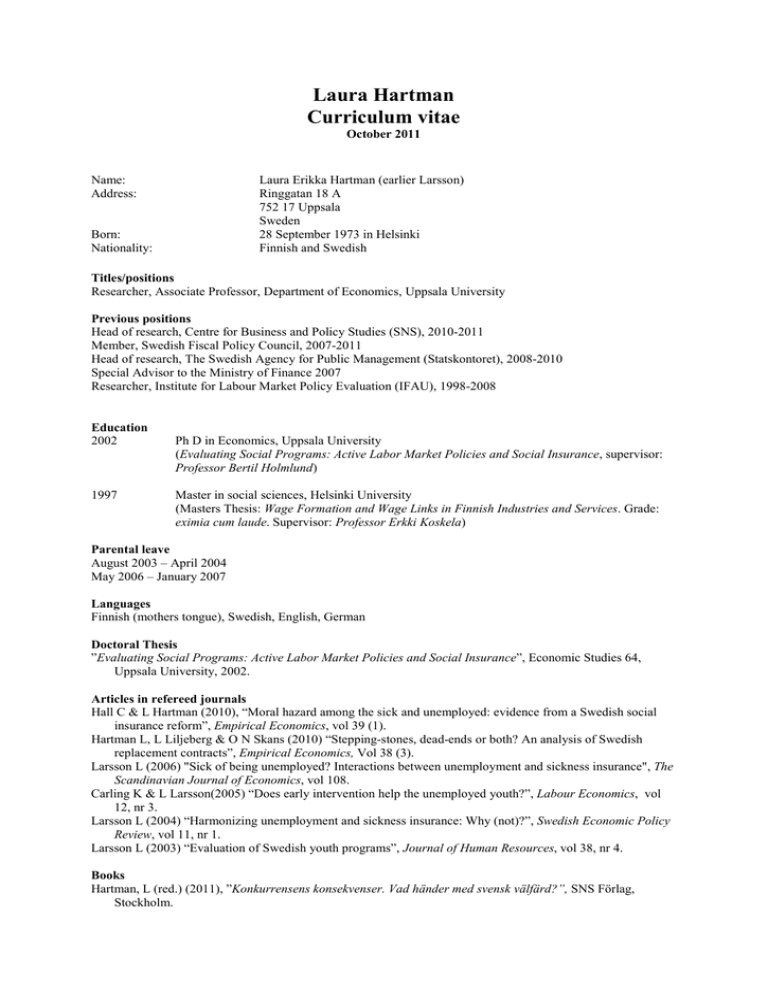
Laura Hartman Curriculum vitae October 2011 Name: Address: Laura Erikka Hartman (earlier Larsson) Ringgatan 18 A 752 17 Uppsala Sweden 28 September 1973 in Helsinki Finnish and Swedish Born: Nationality: Titles/positions Researcher, Associate Professor, Department of Economics, Uppsala University Previous positions Head of research, Centre for Business and Policy Studies (SNS), 2010-2011 Member, Swedish Fiscal Policy Council, 2007-2011 Head of research, The Swedish Agency for Public Management (Statskontoret), 2008-2010 Special Advisor to the Ministry of Finance 2007 Researcher, Institute for Labour Market Policy Evaluation (IFAU), 1998-2008 Education 2002 1997 Ph D in Economics, Uppsala University (Evaluating Social Programs: Active Labor Market Policies and Social Insurance, supervisor: Professor Bertil Holmlund) Master in social sciences, Helsinki University (Masters Thesis: Wage Formation and Wage Links in Finnish Industries and Services. Grade: eximia cum laude. Supervisor: Professor Erkki Koskela) Parental leave August 2003 – April 2004 May 2006 – January 2007 Languages Finnish (mothers tongue), Swedish, English, German Doctoral Thesis ”Evaluating Social Programs: Active Labor Market Policies and Social Insurance”, Economic Studies 64, Uppsala University, 2002. Articles in refereed journals Hall C & L Hartman (2010), “Moral hazard among the sick and unemployed: evidence from a Swedish social insurance reform”, Empirical Economics, vol 39 (1). Hartman L, L Liljeberg & O N Skans (2010) “Stepping-stones, dead-ends or both? An analysis of Swedish replacement contracts”, Empirical Economics, Vol 38 (3). Larsson L (2006) "Sick of being unemployed? Interactions between unemployment and sickness insurance", The Scandinavian Journal of Economics, vol 108. Carling K & L Larsson(2005) “Does early intervention help the unemployed youth?”, Labour Economics, vol 12, nr 3. Larsson L (2004) “Harmonizing unemployment and sickness insurance: Why (not)?”, Swedish Economic Policy Review, vol 11, nr 1. Larsson L (2003) “Evaluation of Swedish youth programs”, Journal of Human Resources, vol 38, nr 4. Books Hartman, L (red.) (2011), ”Konkurrensens konsekvenser. Vad händer med svensk välfärd?”, SNS Förlag, Stockholm. Svensk Finanspolitik, Finanspolitiska Rådets rapport 2011. (Swedish Fiscal Policy, Report from the Swedish Fiscal Policy Council 2011.) Svensk Finanspolitik, Finanspolitiska Rådets rapport 2010. (Swedish Fiscal Policy, Report from the Swedish Fiscal Policy Council 2010.) Svensk Finanspolitik, Finanspolitiska Rådets rapport 2009. (Swedish Fiscal Policy, Report from the Swedish Fiscal Policy Council 2009.) Svensk Finanspolitik, Finanspolitiska Rådets rapport 2008. (Swedish Fiscal Policy, Report from the Swedish Fiscal Policy Council 2008.) Hartman L (red.) (2008) ”Välfärd på deltid (Welfare on part-time)”, SNS Förlag, Stockholm. Larsson L, A Kruse, M Palme & M Persson (2005) "Välfärdsrådets rapport 2005: En hållbar sjukpenningförsäkring (Report from the SNS Welfare Policy council: A sustainable sickness insurance)", SNS Förlag, Stockholm. Other publications Hartman L & H Svaleryd (2010), ”Hur stor är risken för bestående hög arbetslöshet? (How large is the risk of persistent unemployment?”, Ekonomisk Debatt, vol 38, nr 6. Larsson L & C Runeson (2007) “Effekten av sänkt sjukpenning för arbetslösa (The effect of decreased sickness benefits on unemployed)”, Ekonomisk Debatt, vol 35, nr 6. Hesselius P, P Johansson & L Larsson (2006) ”Hur påverkar kravet på läkarintyg sjukfrånvaron? Erfarenheter från ett socialt experiment (How does the requirement of a doctor’s certificate affect sickness absence? Evidence from a social experiment)”, Ekonomisk Debatt, vol 34, nr 2. Larsson L (2004) ”Samspel mellan arbetslöshets- och sjukförsäkringen (Interaction between unemployment and sickness insurance)”, FKF Fakta & Debatt, vol 1, s 35-45 Larsson L (2001) ”Utvärdering av ungdomsprogram (Evaluation of youth programmes)”, Ekonomisk Debatt, vol 29, nr 4. Carling K & L Larsson (2000) ”Att utvärdera arbetsmarknadsprogram i Sverige: Rätt svar är viktigt men vilken var nu frågan? (To evaluate Swedish labour market programmes: It is important to find the correct answer, but what was the question?)”, Arbetsmarknad och Arbetsliv, vol 6, nr 3. Reports and working papers Hartman L, P Johansson, S Khan & E Lindahl ”Uppföljning och utvärdering av Sjukvårdsmiljarden (Evaluation of the “Health care billion”)”, rapport 2009:1, IFAU Hytti H & Hartman L “Integration vs kompensation – välfärdsstrategier kring arbetsoförmåga i Sverige och Finland (Integration vs compensation – welfare strategies for working incapacity in Sweden and in Finland)”, rapport 2008:10, IFAU Hesselius P, P Johansson & L Larsson ”Monitoring sickness insurance claimants: evidence from a social experiment”, Working paper 2005:15, IFAU. Under revision for Journal of Labor Economics. Lindqvist L, L Larsson & O N Skans ”Friårets arbetsmarknadseffekter”, Rapport 2005:10, IFAU Larsson L & O Nordström Skans "Early indication of program performance: The case of a Swedish temporary employment program", Working paper 2004:7, IFAU Fröberg D, L Lindqvist, L Larsson, O Nordström Skans & S Ackum Agell "Friåret ur ett arbetsmarknadsperspektiv – delrapport 1 (Subsidised career breaks – report 1)”, Rapport 2003:7, IFAU Bennmarker, Helge, Lars Davidsson, Anders Forslund, Maria Hemström, Eva Johansson, Laura Larsson, Sara Martinson & Kristian Persson (2000), ”Dataproblem vid utvärderingen av arbetsmarknadspolitik (Data issues with evaluation of labour market policies)”, Stenciler 2000:5, IFAU, Uppsala. Prizes and scholarships EALE Labour Economics Prize for best article in Labour Economics 2004-2005 Wallander scholarship for three years of research, Jan Wallander and Tom Hedelius Foundation, 2003 Myrdal Prize for best article in Ekonomisk Debatt 2001 Yrjö Jahnsson scholarship for Ph D studies abroad, Helsinki, 1997 Nordplus scholarship for exchange studies at Uppsala University, 1995 Referee for journals Empirical Economics, Journal of Population Economics, Journal of Public Economics Swedish Economic Policy Review, The Scandinavian Journal of Economics, Labour Economics
